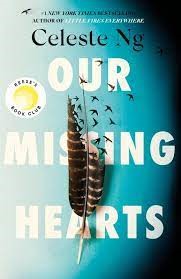Our
Missing Hearts, by Celeste Ng.
In an author’s note at the end of her explosive novel of racial hatred and discrimination, Celeste Ng is careful to stress that the themes she writes about are nothing new; racism against Asian Americans is as old as immigration – The Yellow Peril lurks around every corner, as old and frightening as The Bogey Man, and when her story opens, those of mixed race are particularly vulnerable.
Such a child is Bird, whose Chinese American mother
Margaret fell in love with Ethan Gardner when they were students at
Harvard. They married and made a life
for themselves in an Ivy League town;
Margaret was a published poet, and Ethan had tenure as a professor of
Linguistics – and this section of the story is particularly beautiful, for Ms
Ng uses language like notes of music, making gorgeous melodies as Bird’s parents
educate him in the origins of stories, the meaning of words and the magic of
fairy tales – until the Crisis.
The Crisis is a world-wide economic depression which
results in massive unemployment, huge, countrywide protests and a gradual
belief that China, who seemed to get off lightly compared to the rest of the
world, is behind the terrible reversal of U.S. fortunes. Eventually, the government decides on a
solution: PACT. ‘Protecting America’s Culture and
Traditions.’ Which covers a multitude of
behaviours that would have been unthinkable before the Crisis: the censoring of what is taught to children
in schools; the banning of books
considered inflammatory and ‘Un-American’ in libraries; and worst of all, the removal of children
from their parents, sent who-knows-where because the parents were no longer
considered fit to nurture them as good little Americans.
Such a fate is narrowly avoided for Bird when his mother
decides to flee before she is betrayed by a neighbour or ‘friend’ (very common
these days), and her loving husband is forced to denounce her to anyone who
will listen so that the authorities will not remove Bird from his custody. Because of his wife’s disgrace he has been
hugely demoted and now earns a pittance shelving books in the university
library, but he doesn’t care, as long as he and Bird are still together, even
though Bird’s oriental eyes mean he must wear sunglasses to avoid the bullies.
But Ethan has reckoned without Bird’s natural curiosity,
especially when he receives a mysterious communication by mail – a picture of
cats, seemingly innocuous to the Post Office censors, but to Bird, a message
from his mother after three years of silence.
She is in New York. No matter
what the danger, he must travel there to see her. To find out why she left him, for his father
has never said. To find out why she left
him behind.
Ms Ng’s prose is like a shower of gold coins: in words of great beauty she writes of a
terrible, dystopian society that good, rational people despair of ever repairing,
especially (as she has already said) what has occurred in the novel has already
happened in real life. Every thinking
person should read this book. SIX STARS.



